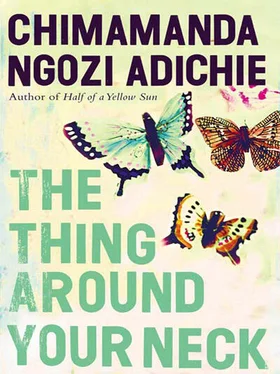Kamara would always remember the air-conditioned staleness of the air when she arrived at the Philadelphia airport. She was still holding her passport, slightly folded on the page that had the visitor’s visa with Tobechi’s name as sponsor, when she came out at Arrivals and there he was, lighter-skinned, chubby, laughing. It had been six years. They clung to each other. In the car, he told her that he had sorted his papers as a single person and so they would marry again in America and he would file for her green card. He took off his shoes when they got to the apartment and she looked at his toes, dark against the milk-colored linoleum of the kitchen floor, and noticed that they had sprouted hair. She did not remember his toes with hair. She stared at him as he spoke, his Igbo interspersed with English that had an ungainly American accent: “Amah go” for “I will go.” He had not spoken like that on the phone. Or had he, and she had not noticed? Was it simply that seeing him was different and that it was the Tobechi of university that she had expected to find? He excavated memories and aired them, rejoiced in them: Do you remember the night we bought suya in the rain? She remembered. She remembered that there had been a crackling thunderstorm and the electric bulbs were blinking and they had eaten the soggy grilled meat with raw onions that made their eyes water. She remembered how they had woken up the next morning with onions heavy on their breath. She remembered, too, how their relationship had been filled with an effortless ease. Now, their silences were awkward, but she told herself that things would get better, they had been apart a long time, after all. In bed, she felt nothing except for the rubbery friction of skin against skin and she clearly remembered the way it used to be between them, he silent and gentle and firm, she loud and grasping and writhing. Now, she wondered if it was even the same Tobechi, this person who seemed so eager, so theatrical, and who, most worrying of all, had begun to talk in that false accent that made her want to slap his face. I wanna fuck you. I’m gonna fuck you . The first weekend he took her out to see Philadelphia, they walked up and down Old City until she was exhausted and he asked her to sit on a bench while he went and bought her a bottle of water. As he walked back toward her in his slightly baggy jeans and a T-shirt, the tangerine-colored sun behind him, she thought for a moment that he was somebody she did not know at all. He would come home from his new job as a manager at Burger King bearing a little gift: the latest Essence magazine, Maltina from the African store, a chocolate bar. On the day they went to a courthouse to exchange vows in front of an impatient-looking woman, he whistled happily as he knotted his tie and she watched him with a kind of desperate sadness, wanting so much to feel his delight. There were emotions she wanted to hold in the palm of her hand that were simply no longer there.
While he was at work, she would pace the apartment and watch TV and eat everything in the fridge, even spoonfuls of margarine after she had finished the bread. Her clothes pinched her waist and armpits, and so she took to walking around with only her abada wrapper tied loosely around her and knotted under her arm. She was finally with Tobechi in America, finally with her good man, and the feeling was one of flatness. It was only Chinwe she felt she could really talk to. Chinwe was the friend who had never told her she was foolish to wait for Tobechi, and if she told Chinwe how she did not like her bed but did not want to get up from it in the morning, Chinwe would understand her bewilderment.
She called Chinwe and Chinwe began to cry after the first hello and kedu . Another woman was pregnant for Chinwe’s husband and he was going to pay her bride price because Chinwe had two daughters and the woman came from a family of many sons. Kamara tried to soothe Chinwe, raged about the useless husband, and then hung up without saying a word about her new life; she could not complain about not having shoes when the person she was talking to had no legs.
With her mother on the phone, she said everything was fine. “We will hear the patter of little feet soon,” her mother said, and she said “ Ise! ” to show that she seconded the blessing. And she did: she had taken to closing her eyes while Tobechi was on top of her, willing herself to become pregnant, because if that did not shake her out of her dismay at least it would give her something to care about. Tobechi had brought her contraception pills because he wanted a year of just the both of them, to catch up, to enjoy each other, but she flushed one pill down the toilet each day and wondered how he could not see the grayness that clouded her days, the hard things that had slipped in between them. On Monday of last week, though, he had noticed the change in her.
“You’re bright today, Kam,” he said as he hugged her that evening. He sounded happy that she was bright. She was both thrilled and sorry, for having this knowledge she could not share with him, for suddenly believing again in ways that had nothing to do with him. She could not tell him how Tracy had come upstairs to the kitchen and how surprised she had been because she had given up wondering what kind of mother this was.
“Hi, Kamara,” Tracy had said, coming toward her. “I’m Tracy.” Her voice was deep and her womanly body was fluid and her sweater and hands were paint-stained.
“Oh, hello,” Kamara said, smiling. “Nice to finally meet you, Tracy.”
Kamara held out a hand but Tracy came close and touched her chin. “Did you ever wear braces?”
“Braces?”
“Yes.”
“No, no.”
“You have the most beautiful teeth.”
Tracy’s hand was still on her chin, slightly tilting her head up, and Kamara felt, first, like an adored little girl, and then like a bride. She smiled again. She was extremely aware of her body, of Tracy’s eyes, of the space between them being so small, so very small.
“Have you ever been an artist’s model?” Tracy asked.
“No … no.”
Josh came into the kitchen and rushed to Tracy, his face lit up. “Mommy!” Tracy hugged him and kissed him and ruffled his hair. “Have you finished your work, Mommy?” He clung to her hand.
“Not yet, honey.” She seemed to be familiar with the kitchen. Kamara had expected that she would not know where the glasses were kept or how to operate the water filter. “I’m stuck, so I thought I’d come upstairs for a little while.” She was smoothing Josh’s hair. She turned to Kamara. “It’s stuck right here in my throat, you know?”
“Yes,” Kamara said, although she did not know. Tracy was looking right into her eyes in a way that made Kamara’s tongue feel blubbery.
“Neil says you have a master’s degree,” Tracy said.
“Yes.”
“That’s wonderful. I hated college and couldn’t wait to graduate!” She laughed. Kamara laughed. Josh laughed. Tracy riffled through the mail on the table, picked up one envelope and tore it open and put it back. Kamara and Josh watched her in silence. Then she turned. “Okay, I guess I better get back to work. See you guys later.”
“Why don’t you show Josh what you’re working on?” Kamara asked, because she could not bear the thought of Tracy leaving.
Tracy seemed taken aback by the suggestion for a moment, then she looked down at Josh. “Want to see it, buddy?”
“Yeah!”
In the basement, a wide painting leaned against the wall.
“It’s pretty,” Josh said. “Right, Kamara?”
It looked like haphazard splashes of bright paint to her. “Yes. It’s very nice.”
She was more curious about the basement itself, where Tracy practically lived, the slumping couch and cluttered tables and coffee-stained mugs. Tracy was tickling Josh and Josh was laughing. Tracy turned to her. “Sorry it’s such a mess in here.”
Читать дальше











